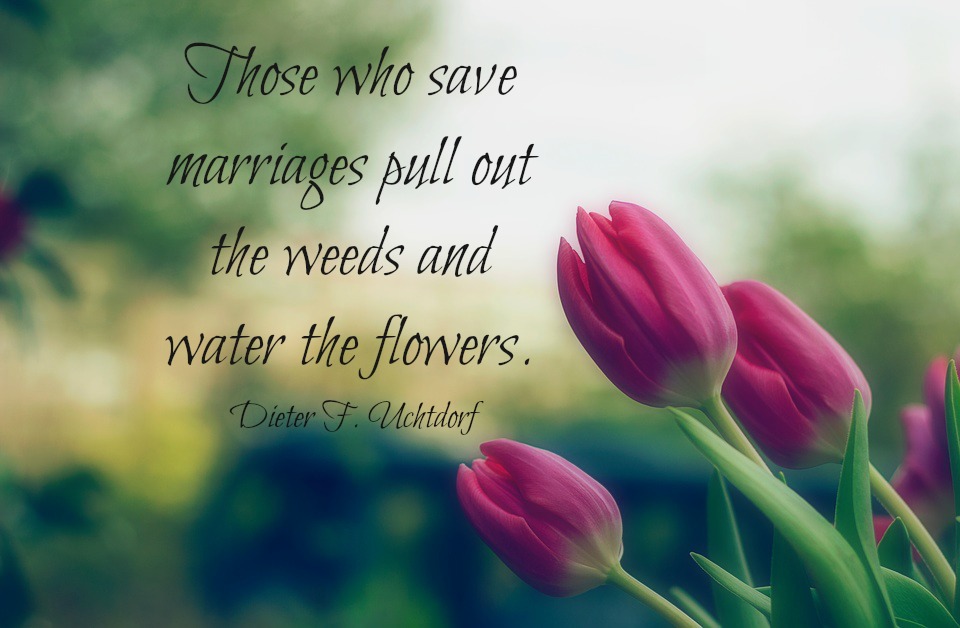The tabloids are full of gossipy tidbits about which celebrities have been unfaithful and which ones are getting divorced. And we think if that person’s marriage wasn’t safe, then how can mine be? As I have pondered this, I realized that I know what infidelity is, but what is fidelity? Especially fidelity in marriage. I know that Mormons believe in marriage. And fidelity in it. But what exactly does that mean?
What is Fidelity?
Fidelity is certainly one of those old-fashioned words. Infidelity is cheating and being unfaithful to your spouse, so fidelity means being faithful. But it’s so much deeper than that. Merriam-Webster’s defines fidelity as:
: the quality or state of being faithful
: accuracy in details: exactness
The evolution of the word helps to convey its deeper meaning, especially in relationships:
… “Fidelity” … has existed in English since the 15th century; its etymological path winds back through Middle English and Middle French, eventually arriving at the Latin verb fidere, meaning “to trust.” “Fidere” is also an ancestor of other English words associated with trust or faith, such as “fiduciary” (which means “of, relating to, or involving a confidence or trust” …) and “confide” (meaning “to trust” or “to show trust by imparting secrets”).
… Fidelity implies strict and continuing faithfulness to an obligation, trust or duty.
Complete faithfulness is essential to marriage. But when we’re talking about not just men and women but moms and dads, then the stakes are raised even higher. The Family: A Proclamation to the World states:
Children are entitled to birth within the bonds of matrimony, and to be reared by a father and a mother who honor their marital vows with complete fidelity.
Parents are entrusted with a sacred charge. For moms and dads, this strict and continuing faithfulness to each other is their obligation, trust and duty not only to each other but also to their children. So how do we cultivate fidelity in marriage? And what happens when that trust is broken?
Fidelity Begins in the Heart
Most people believe in marriage. And they don’t intend to be unfaithful. Infidelity is a process that be easily rationalized away unless we are careful and truly in tune with our spouses. The scriptures teach that husbands and wives are to cleave unto each other and to none else. (See Doctrine & Covenants 42:22-26.) President Spencer W. Kimball said,
The words none else eliminate everyone and everything. The spouse then becomes pre-eminent in the life of the husband or wife and neither social life nor occupational life nor political life nor any other interest nor person nor thing shall ever take precedence over the companion spouse (The Miracle of Forgiveness, Salt Lake City: Bookcraft, 1969, p. 250).
Veon G. Smith, at the time a professor of social work and director of the Marriage and Family Counseling Bureau, University of Utah, said,
Infidelity is a subtle process. It does not begin with adultery; it begins with thoughts and attitudes. Each step to adultery is short, and each is easily taken; but once the process starts, it is difficult to stop.
Perhaps one reason the process is difficult to stop is because it can be difficult to detect in the first place. This can begin as innocently as a friendship or a working relationship. Professor Kenneth W. Matheson, at the time a professor in the School of Social Work at Brigham Young University, taught,
Emotional infidelity, which occurs when emotions and thoughts are focused on someone other than a spouse, is an insidious threat that can weaken the trust between a couple and shatter peace of mind.
Emotional infidelity doesn’t usually happen suddenly; rather, it occurs gradually—often imperceptibly at first. This is one reason why those involved often feel innocent of any wrongdoing.
It is for this reason that communication is key to a successful marriage relationship. We must be in tune with our spouses and their feelings because if we are, then one spouse can feel when the other is starting to pull away. Professor Smith said,
Any uneasiness about a situation should be taken seriously, even though “nothing’s happening.” The subtle shift from marital fidelity to infidelity is like the gradual shading from daylight to darkness.
Professor Matheson said,
Relationships with others of the opposite sex are not in and of themselves a problem or a fracture of fidelity. In fact, many of our meaningful relationships with neighbors, Church friends, co-workers, and others have a balanced and important place in our lives. However, there is a danger zone that people may cross into if they are not watchful. …
We should be careful not to allow relationships even to begin to develop inappropriately. … Not only our actions relative to other people, but also our thoughts must be guarded.
This includes the way we talk to others about our spouses. Are we telling our friends and others about how frustrating our spouses can be? Or are we focusing on the positive aspects of our partners? This, to me, is one key to fidelity in marriage. When we speak unkindly about our spouse, then it is too easy to justify pulling away and finding companionship and validation elsewhere. President Dieter F. Uchtdorf warned,
Somehow, as the days multiply and the color of romantic love changes, there are some who slowly stop thinking of each other’s happiness and start noticing the little faults. In such an environment, some are enticed by the tragic conclusion that their spouse isn’t smart enough, fun enough, or young enough. And somehow they get the idea that this gives them justification to start looking elsewhere.
… If this comes close to describing you at all, I warn you that you are on a road that leads to broken marriages, broken homes, and broken hearts.
Our Time, Priorities and Affection Belong to Our Families
Marriage brings a man and a woman together in love. If we want our marriage to be strong, then we must devote all of our time and affection to our spouse—our family must be our priority. Professor Smith said:
Fidelity, like infidelity, is a process. Fidelity, the positive quality, is measured by the degree of loyalty, allegiance, and commitment between husband and wife. Infidelity, the negative quality, results from insufficient feelings of loyalty and allegiance. Any action that fosters inappropriate relationships with another person erodes fidelity.
Two souls, united in matrimony, can achieve spiritual and temporal unity only if they constantly increase their friendship, love, and loyalty by expressing their feelings verbally, by maintaining mutual respect, and by demonstrating concern for each other.
Marriage is hard work—especially when you have children. Your time is divided between lots of responsibilities. But that makes it even more important to make time for each other and your marriage. President Uchtdorf taught,
… We must place high priority on our families. We build deep and loving family relationships by doing simple things together, like family dinner and family home evening and by just having fun together. In family relationships, love is really spelled t-i-m-e, time. Taking time for each other is the key for harmony at home. We talk with, rather than about, each other. We learn from each other, and we appreciate our differences as well as our commonalities.
This is an impossible task if one spouse is pouring his or her time, priorities and affection into someone who is an interloper in the family. Most of us have commitments outside the home — work, PTA, Church, kids’ sports, just to name a few. But in our relationships outside of our families, we must maintain our boundaries. Professor Smith said,
Both men and women must be very clear about their marital commitments and must be committed to the process of maintaining fidelity within marriage.
President Uchtdorf taught,
Great marriages are built brick by brick, day after day, over a lifetime.
And that is good news.
Because no matter how flat your relationship may be at the present, if you keep adding pebbles of kindness, compassion, listening, sacrifice, understanding, and selflessness, eventually a mighty pyramid will begin to grow.
A mighty pyramid that will last not only through this life but also through the eternities.
The Role of Mom and Dad in a Family
Mormons believe that the family is sacred and is instituted of God. It should not be taken lightly. Elder L. Tom Perry taught,
The entire theology of our restored gospel centers on families and on the new and everlasting covenant of marriage. In The Church of Jesus Christ of Latter-day Saints, we believe in a premortal life where we all lived as literal spirit children of God our Heavenly Father. We believe that we were, and still are, members of His family.
We believe that marriage and family ties can continue beyond the grave—that marriages performed by those who have the proper authority in His temples will continue to be valid in the world to come. Our marriage ceremonies eliminate the words “till death do us part” and instead say, “for time and for all eternity.”
We also believe that strong traditional families are not only the basic units of a stable society, a stable economy, and a stable culture of values—but that they are also the basic units of eternity and of the kingdom and government of God.
Fidelity to marriage and family isn’t just an earthly commitment but an eternal one—with eternal consequences. You can’t fully appreciate the need for fidelity in marriage if you don’t understand and appreciate how important each spouse is in the family dynamic. Neither is replaceable in a marriage, and neither is replaceable in a child’s life. It takes a man and a woman to create a child, and it takes a mother and father to raise one. The Family: A Proclamation to the World teaches:
… By divine design, fathers are to preside over their families in love and righteousness and are responsible to provide the necessities of life and protection for their families. Mothers are primarily responsible for the nurture of their children. In these sacred responsibilities, fathers and mothers are obligated to help one another as equal partners.
Men and women, mothers and fathers, have complementary roles. Elder Perry said,
Fathers most often spend much of their day away from home in their employment. That is one of the many reasons so much of the responsibility for teaching the child in the home falls on mothers. While circumstances do vary and the ideal isn’t always possible, I believe it is by divine design that the role of motherhood emphasizes the nurturing and teaching of the next generation.
However, in this sacred partnership, the roles of mother and father also overlap. Elder Perry said,
… It is wonderful to see husbands and wives who have worked out real partnerships where they blend together their influence and communicate effectively both about their children and to their children.
Men and women have sacred roles as spouses and as parents. Parents have been given a very solemn trust in the teaching of their children. It is an obligation that we undertake when we welcome them into our home. Elder Perry said,
Lessons taught in the home by goodly parents are becoming increasingly important in today’s world, where the influence of the adversary is so widespread. As we know, he is attempting to erode and destroy the very foundation of our society—the family. In clever and carefully camouflaged ways, he is attacking commitment to family life throughout the world and undermining the culture and covenants of faithful Latter-day Saints. Parents must resolve that teaching in the home is a most sacred and important responsibility. While other institutions such as church and school can assist parents to “train up a child in the way he [or she] should go” (Proverbs 22:6), this responsibility ultimately rests on the parents. According to the great plan of happiness, it is goodly parents who are entrusted with the care and development of Heavenly Father’s children.
Parents cannot effectively teach their children about God and His commandments if they themselves are not setting the example. In fact, how parents treat each other sets the ultimate example for their children. Sister Elaine S. Dalton taught,
How can a father raise a happy, well-adjusted daughter in today’s increasingly toxic world? The answer has been taught by the Lord’s prophets. It is a simple answer, and it is true—“The most important thing a father can do for his [daughter] is to love [her] mother.” By the way you love her mother, you will teach your daughter about tenderness, loyalty, respect, compassion, and devotion. She will learn from your example what to expect from young men and what qualities to seek in a future spouse. You can show your daughter by the way you love and honor your wife that she should never settle for less. Your example will teach your daughter to value womanhood. You are showing her that she is a daughter of our Heavenly Father, who loves her.
The same is true for mothers and how they treat their husbands. Our sons learn the value of men and manhood from their mothers who love, honor and cherish their husbands and their contribution to the home. What do we teach them about the value of men and fathers, or women and mothers, if we dishonor our spouses in any way?
Infidelity Leaves a Trail of Broken Hearts
Infidelity in a marriage leaves a trail of betrayal and broken hearts, affecting not only the spouse but children as well. Professor Smith said,
Common outcomes of physical infidelity include lack of trust, suspicion about unexplained absences, insecurity and uncertainty that can lead to violent possessiveness, confusion about oneself as a man or a woman, intense guilt about the broken covenants, and an emotional chaos that may render a person unable to cope with business affairs, the children, and normal responsibilities.
Children, especially, suffer from parental infidelity. All children are sensitive to the kind of relationship their parents have and attempts to conceal true feelings hardly ever work. If the child is over the age of ten, he likely senses something is wrong and either panics, feels responsible, or develops emotional problems because of the lack of positive feelings in the home. Even preschool children sense a lack of love between parents and become uncertain about themselves and their place in the home. Any degree of infidelity, then, ricochets to the child and affects his feelings about himself, his parents, and the general subjects of love and marriage. Infidelity on the parents’ part can actually affect a child’s performance as a marriage partner many years later.
This isn’t to say that infidelity—especially physical infidelity— has to end a marriage. Rather, the road to healing and forgiveness is long and painful for the entire family. The best thing is to strengthen our marriages and families and watch out for any signs of weakness before the cracks turn into canyons. Professor Smith taught,
Like most illnesses, infidelity is easier to prevent than to remedy, and the best prevention is to work hard at developing a good marriage. Temple marriage, entered into with a firm commitment to make the marriage an eternal relationship, is a solid foundation. Strong personal commitment, not only to one’s spouse, but to the institution of marriage as it has been divinely ordained, emphasizes the necessity of faithfulness—not only faithfulness to another person, but faithfulness to our Father in heaven.
Trust in one another is an essential ingredient in marriage. The commitment to “cleave” unto the partner and “forsake all others” provides stability.
Other factors that foster fidelity include honesty in communication—being personally willing to discuss any subject that concerns you or your partner. Sharing ideas and daily experiences produces emotional intimacy, and such feelings make it natural to behave in loyal ways. Feelings of dissatisfaction, boredom, or irritation are danger signals that need immediate attention.
As moms and dads, we owe it to our children to ensure that we provide a stable home and family environment for them—by honoring our marriage covenants. Fidelity in marriage starts with how we treat each other, how we talk about each other—and how we see each other. As President Uchtdorf taught,
Those who save marriages pull out the weeds and water the flowers. They celebrate the small acts of grace that spark tender feelings of charity. Those who save marriages save future generations.







